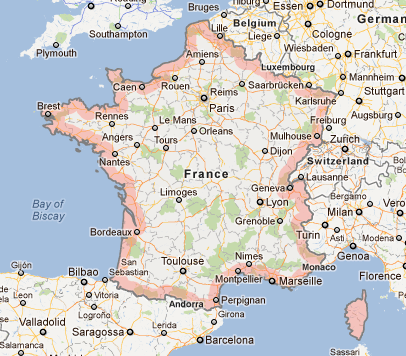PARENT PERSPECTIVES
A Family’s Journey:
The French Context

Grenoble, France
In France 80% of professionals have a psychoanalytic approach to autism – for them, autism is a mental illness. They believe the child has a psychosis, which is induced by his environment; he has a classic neurological functioning, but something in his familial environment has traumatised him and he has built defenses to cope with this environment. Finally they say he takes refuge in his world to escape the real world.
The treatment consists of not intervening, since the desire to come out of his world must come from inside himself.
The professionals, when they speak to the public, don’t directly say all this, so as not to have conflict with the parents’ associations. They say that there are many factors, so there is a place for their approach. “Many factors” means for them that treatment must take several approaches, including psychoanalysis. This is the approach that is taught to students of psychology and psychiatry, in most university programs. The discoveries on the neurology of the brain are seen as a validation of the psychoanalytic theories.
Behavioral and cognitive approaches are not well represented in the universities, because of the strong pressure put on by the psychoanalysts, who are the majority.
Typical path of an uninformed family
At the baby-nursery (0-3 years) or at the nursery (3 years), the school psychologist or psychologist of the baby-nursery, or the pediatrician, have the child brought to the Medico-Psychology Center (a public institution). There, they see the child and the parents; while the child “plays”, they interrogate the parents, giving them to understand that they are responsible for the child’s problems. Nothing is said of these problems. But the professionals mark on the dossier of the child “infantile psychosis.”
The school puts pressure on the parents for them to take their child out and place him or her in an institution the psychiatric day clinic. The education team works with the medical team to accomplish this.
When the parents request a handicap allocation (financial support) from the state, the state proposes placement in an institution (no education provided, psychoanalytic approach). If the parents refuse, the allocation is denied. The authorities can report the parents to social services for “lack of care.” The child is considered to be psychotic, therefore it is implied that the familial environment is to blame; that is sufficient to remove parental authority.
The child is taken out of a learning environment little by little, hour by hour, then shut up in a hospital or institution. There no one takes care of him. The caregivers refuse to give the parents any information about what the child does during the day. Instead they interrogate the parents about how the problem happened, make them the guilty ones. The behavior problems are seen as anguish, which must be calmed. Since they don’t try to improve the behavior problems, they ask the parents to administer narcoleptic drugs, to calm the child.
Cost
A day in an institution costs about 800 euros ($1040 per day or $232,920 per year), paid by the social security. The child goes to the institution by taxi, also paid by the state. Thus it is free for the families.
Any other type of treatment is at a cost to the parents, including transport.

* Magali Pignard is the mother of a 6 year-old son Julien diagnosed with an autism spectrum disorder who lives in Grenoble, France. She graduated from Université Joseph Fourier Grenoble, Université de Montreal. She is a very active member of the "Collective to support The Wall and Stand Up for Human Rights in France for Autism.” She is author of the Blog,"autiste en france " (in an earlier version of this report, I had erroneously stated her blog was called “Infantile Autism,”) and was awarded the first prize of the "Autism Expert Lecture Series" by Autism Today, for her video “Autism Today in France.” She is also a free lance musician.
Editor’s Note: According to the International Diagnostic Classification system, which is used throughout the world for medical diagnosis, autism has not been considered a form of childhood psychosis since 1977 when the ICD-9 diagnostic manual was published, including in France. Using inappropriate diagnostic labels is inconsistent with international medical standards under the World Health Organization, which oversees the ICD system.
The treatment consists of not intervening, since the desire to come out of his world must come from inside himself.
The professionals, when they speak to the public, don’t directly say all this, so as not to have conflict with the parents’ associations. They say that there are many factors, so there is a place for their approach. “Many factors” means for them that treatment must take several approaches, including psychoanalysis. This is the approach that is taught to students of psychology and psychiatry, in most university programs. The discoveries on the neurology of the brain are seen as a validation of the psychoanalytic theories.
Behavioral and cognitive approaches are not well represented in the universities, because of the strong pressure put on by the psychoanalysts, who are the majority.
Typical path of an uninformed family
At the baby-nursery (0-3 years) or at the nursery (3 years), the school psychologist or psychologist of the baby-nursery, or the pediatrician, have the child brought to the Medico-Psychology Center (a public institution). There, they see the child and the parents; while the child “plays”, they interrogate the parents, giving them to understand that they are responsible for the child’s problems. Nothing is said of these problems. But the professionals mark on the dossier of the child “infantile psychosis.”
The school puts pressure on the parents for them to take their child out and place him or her in an institution the psychiatric day clinic. The education team works with the medical team to accomplish this.
When the parents request a handicap allocation (financial support) from the state, the state proposes placement in an institution (no education provided, psychoanalytic approach). If the parents refuse, the allocation is denied. The authorities can report the parents to social services for “lack of care.” The child is considered to be psychotic, therefore it is implied that the familial environment is to blame; that is sufficient to remove parental authority.
The child is taken out of a learning environment little by little, hour by hour, then shut up in a hospital or institution. There no one takes care of him. The caregivers refuse to give the parents any information about what the child does during the day. Instead they interrogate the parents about how the problem happened, make them the guilty ones. The behavior problems are seen as anguish, which must be calmed. Since they don’t try to improve the behavior problems, they ask the parents to administer narcoleptic drugs, to calm the child.
Cost
A day in an institution costs about 800 euros ($1040 per day or $232,920 per year), paid by the social security. The child goes to the institution by taxi, also paid by the state. Thus it is free for the families.
Any other type of treatment is at a cost to the parents, including transport.

* Magali Pignard is the mother of a 6 year-old son Julien diagnosed with an autism spectrum disorder who lives in Grenoble, France. She graduated from Université Joseph Fourier Grenoble, Université de Montreal. She is a very active member of the "Collective to support The Wall and Stand Up for Human Rights in France for Autism.” She is author of the Blog,"autiste en france " (in an earlier version of this report, I had erroneously stated her blog was called “Infantile Autism,”) and was awarded the first prize of the "Autism Expert Lecture Series" by Autism Today, for her video “Autism Today in France.” She is also a free lance musician.
Editor’s Note: According to the International Diagnostic Classification system, which is used throughout the world for medical diagnosis, autism has not been considered a form of childhood psychosis since 1977 when the ICD-9 diagnostic manual was published, including in France. Using inappropriate diagnostic labels is inconsistent with international medical standards under the World Health Organization, which oversees the ICD system.